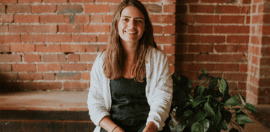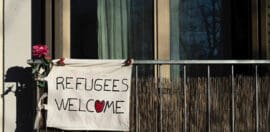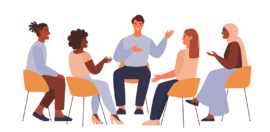The importance of ‘Healing’ in Refugee Week 2022

22 June 2022 at 10:49 am
We speak to refugees, advocates and community leaders about the theme of this year’s Refugee Week and what healing could look like.
The past year has been a difficult one for refugee communities, with global affairs forcing communities into evacuation for their safety.
From the plight of Kabul to the war in Ukraine, refugees are also confronting policies that impact their settlement, on top of the trauma of moving away from home.
Against this backdrop, it seems fitting that the theme for this year’s Refugee Week (taking place from 19 June to 25 June) is “healing”.
The theme aims to highlight aspects of the refugee experience and engage the broader community on what it is like to be a refugee.
Here, we speak to refugees, advocates and community leaders about this year’s theme and what healing could look like.
Dulce Muñoz
National convener, Mums4Refugees
 Australia is in a powerful position to not only offer refugees safety and protection but also provide a settlement program that is holistic and compassionate so people can focus on rebuilding their lives in order to thrive.
Australia is in a powerful position to not only offer refugees safety and protection but also provide a settlement program that is holistic and compassionate so people can focus on rebuilding their lives in order to thrive.
As newly arrived refugees find ways to heal from their traumatic pasts, they’re also juggling the anxieties that might stem from having uncertainties in their future in Australia.
To alleviate these added stresses so that refugees can get on their journeys to wellness, the immigration model needs to change. Key to this is providing more comprehensive and inclusive paths to permanency so that refugee communities have a sense of much-needed security and feel empowered knowing that a positive lies ahead for them in Australia.
This way, many can redirect their energy to focus on healing and taking care of themselves, instead of all the burdens that may come with complicated visa conditions.
It is also important to embrace refugees and people seeking asylum with an abundance of resources and support necessary for healing to be possible.
Having systems in place to provide accessible and culturally appropriate basic safety net services like Medicare and NDIS, is of utmost importance to support those with significant trauma to achieve better health.
By humanising our treatment of people who arrive as asylum seekers and refugees, we help enable their healing journeys and inspire growth among all communities.
Catherine Maguire-Donvito
Co-founder, creative producer and supervising psychologist, Treehouse Theatre
 To support the refugee community, it is critical that we invest in programs that not only empower them to heal, but also enable them to do so.
To support the refugee community, it is critical that we invest in programs that not only empower them to heal, but also enable them to do so.
The healing journey is multifaceted and requires support from all angles, whether it be linked to psychological, health, administrative or more tangible supports like the provision of secure housing and everyday essentials.
Particularly for young refugees, the trauma of leaving their home to resettling in a foreign country is something that will stick with them their entire lives. It is how they deal with their past that will enable a healing journey.
This is why it is critical to create programs that effectively provide young people with the tools to grapple with their trauma in ways that ensure their wellbeing.
At Treehouse Theatre, we provide a platform for young refugees to share their life stories and recover from trauma. Therapeutic group storytelling and performing in a public theatre, allows friends, family and the wider community to bear witness to the life events which made them refugees.
The creative and collaborative approach allows young people to control their own stories and see themselves as survivors rather than victims of trauma.
Treehouse helps young refugees to feel validated as human beings, to feel confident and capable of making a wonderful future for themselves here in Australia.
We need to come together as a community to invest in programs that give refugees a safe and supportive space to process past experiences.
This way, we will see new pathways for refugees to accelerate their trauma recovery and go on to make positive a contribution to our wonderful multicultural Australian society.
Hedayat Osyan
CEO, CommUnity Construction
 Australia needs to take a balanced approach regarding migration and refugees. Australia used to have a humanitarian visa intake of over 18,000, but this has decreased in recent years.
Australia needs to take a balanced approach regarding migration and refugees. Australia used to have a humanitarian visa intake of over 18,000, but this has decreased in recent years.
We know there are millions of refugees around the world, and recent events in Afghanistan and Ukraine have highlighted this growing and truly international issue.
Australia should be taking in at least 30,000 refugees and asylum seekers on humanitarian visas each year. It would be the humane thing to do – millions around the world are desperate and homeless, and Australians have an opportunity and desire to help.
Increasing our humanitarian intake would be a win-win as it would contribute to addressing the global refugee crisis while rebuilding Australia’s reputation as a humane society.
Plus, the ongoing labour shortage across various industries continues to make headlines. If we took a humane approach to addressing the needs of our local industries, it would be clear that refugees and asylum seekers could hold the solutions to many of our labour problems across manufacturing, construction, and more.
This may sound optimistic to some, but as someone from a refugee background who has built a construction business wholly through the employment of refugees and asylum seekers to help some of Australia’s largest construction companies plug their labour gaps, I can attest to the reality and genuinely positive outcomes that this open-minded and humane approach can make.
It’s not just the right thing to do, for cynics with economic concerns, it’s time to recognise this is also simply good business.
Dr Linny Kimly Phuong
Founder and chair, The Water Well Project
 Health plays a pivotal role in our ability to live happy, healthy lives. Yet unfortunately, many refugees and asylum seekers in Australia have a significantly lower health literacy rate than the broader community.
Health plays a pivotal role in our ability to live happy, healthy lives. Yet unfortunately, many refugees and asylum seekers in Australia have a significantly lower health literacy rate than the broader community.
Unfortunately, the pandemic highlighted the poorer healthcare outcomes for migrant, refugee and asylum seeker communities. Data from the ABS shows the rate of death from COVID-19 for those born overseas was almost three times higher than those born in Australia, this went up to 10 times for those from the Middle East.
When you have a low level of health literacy, it means you have a reduced awareness and uptake of preventative services, including cancer screenings and immunisations, are less likely to take medication as directed and you might put off seeing a healthcare professional when you are sick.
At The Water Well Project, we provide free, interactive health education sessions to community groups from migrant, refugee and asylum seeker backgrounds.
For those born in Australia, it’s easy to take our great healthcare system for granted and easily forget that it can be hard to navigate at times.
This World Refugee Day, we hope to open up discussions about the disparity in healthcare access and understanding amongst the communities we support and highlight the need to invest in education to close this gap.
The importance of health in our lives, especially for those that have already suffered significant trauma cannot be underestimated.









Why turn back refugees to srilanka please help to refugees